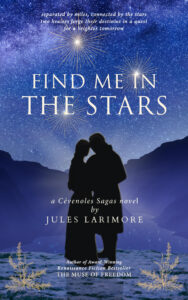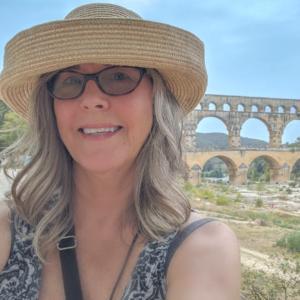Launch: Jules Larimore’s Find Me in the Stars
INTERVIEW BY KEIRA MORGAN
Jules Larimore is the author of emotive, literary-leaning historical fiction with a dose of magic, myth, and romance to bring to life hopeful human stories and inspire positive change. She is a member of France’s Splendid Centuries authors’ collaborative, a board member of the Historical Novel Society of Southern California, and lives primarily in Ojai with time spent around the U.S. and Europe gathering a rich repository of historical research in a continued search for authenticity. She’ll be heading to the HNS UK Conference in September to speak on a panel entitled “The Allure of French Historical Dramas on Screen and in Novels.”
How would you describe Find Me in the Stars and its themes in a couple of sentences?
Find Me in the Stars is a sweeping tale of sacrifice, separation, and abiding love, inspired by the true story of a French Huguenot refugee during Louis XIV’s oppressive rule. Separated by miles, connected by the stars, two healers forge their destinies in a quest for a brighter tomorrow.
 What attracted you to writing historical fiction about the French Huguenots? What has been the most rewarding thing about it?
What attracted you to writing historical fiction about the French Huguenots? What has been the most rewarding thing about it?
I felt a calling for over twenty years to write a story inspired by Jean Pierre Bondurant dit Cougoussac, a French Huguenot (Reformed Protestant) ancestor. As a minor noble during a time of religious persecutions against Huguenots, his motivation to give everything up and flee the country always intrigued me.
Once I dove into the research, I became utterly fascinated with this obscure period. I wrote the story as a thrilling adventure to transport the reader with the hope that it might influence positive change in the world.
How do the characters transform and what does that journey mean to you?
Jehan, my main protagonist, experienced complex, rapidly evolving emotions during the first book. Writing his character allowed me to tap into my own feelings about not fitting in and to convey my strong desire to see tolerance for all.
By the time Find Me in the Stars begins, several alarming experiences and the female protagonist, Amelia, have influenced Jehan to hold fast to his values. He champions tolerance and compassion while seeking a peaceful Eden with other like-minded people.
How have you incorporated your life and work experiences in your writing?
I have had a passion for history and past cultures since I was young and took courses in those subjects at university. Architectural design studies gave me a good basis for settings, and a narrative composition course offered a foundation for fiction writing. But a debate with my instructor over the use of the “Oxford comma”, discouraged me from continuing to study writing!
My career path has been a crooked road that finally led to writing full time, despite that instructor. I’ve worked in interior design, graphic design, and event planning and marketing. The latter became an early outlet for creative writing. During that time, I began writing freelance non-fiction for print magazines and online publications in the responsible travel sector. I finally returned to my creative writing studies, completing several Master Classes and workshops. I now focus my non-fiction writing on historical subjects and people that complement my research for future works.
What kind of research did you do for this story? Did you take any trips or conduct interviews during your research?
Research trips are a huge part of my writing process. I like to experience a place through its flora and fauna, geology and architecture, and to hear the voices of the people who lived during the era I am writing about, before I do much other research.
I’ve returned to the Cévennes a few times. I had the opportunity to meet the owner of the old Bondurant maison de ville in Genolhac, France, who shared a few secrets about what transpired there. My visits allowedme to touch the same walls and windows, to walk across the same ancient stone floors, to look out onto the same garden as my characters. I also immersed myself in the Museé du Desert to learn about the tools, furnishings, clothing, weapons, and religious objects that were used in the late 17th/early 18th centuries.
Fortunately, France does a wonderful job of digital archiving, so departmental archives became a primary method for research.
How did you balance the research with writing the story?
I organized my research into two main documents, a timeline and notes on cultural details. These contain everything I thought might be relevant to the stories in my series. The documenting and organizing of my research help infuse the details as if they were a part of my own experience. Then I outline, and as I write chapters, I have the documents to jog my memory. I’d say I used about half of what I documented since I focus on authenticity in my stories.
Do you plan to keep writing in this period or are you thinking of changing periods or genres?
I am currently researching four novels. One is the third book in the Huguenot trilogy which takes my characters to colonial Virginia in their search for “Eden”. The other three are about Capetian ancestors: Queen Adelaide de Maurienne of France; her daughter, Constance de France, Comtesse of Toulouse; and her daughter, Comtesse Adelaide de Toulouse. Which of these books gets published first is yet to be seen.
 Each author has had her own publishing journey. Tell me about yours.
Each author has had her own publishing journey. Tell me about yours.
I decided to self-publish my first book in the Huguenot series because I had a built-in audience through the Bondurant Family Association and various Huguenot groups. I completed a successful crowd-funding campaign to launch it. When my second was ready, I had grown my social media following and email list substantially, and I self-published to avoid waiting months or years to publish the book, but it was much more work. This time, I’ve already begun querying traditional publishers about my future books and received some interest.
What are your next projects and where are you with them?
The audiobook of my first novel, The Muse of Freedom, is being recorded in August. Then I am off to the UK to present a session at the Historical Novel Society conference before I head to France for a few days of research in the Cévennes mountains, near Toulouse and Carcassonne. Next, I am leading a readers’ tour through Cathar country and into the Cévennes to visit locations in my novels.
What is the last great book you read?
Speaks the Nightbird by Robert McCammon.
You can find Jules Larimore’s book on the following promotions:
https://books.bookfunnel.com/womenshistoricalfictionjuly/3lziiy1d0j
https://books.bookfunnel.com/FrenchHistoricalFictionSummerReading/wg6ky6d98z






